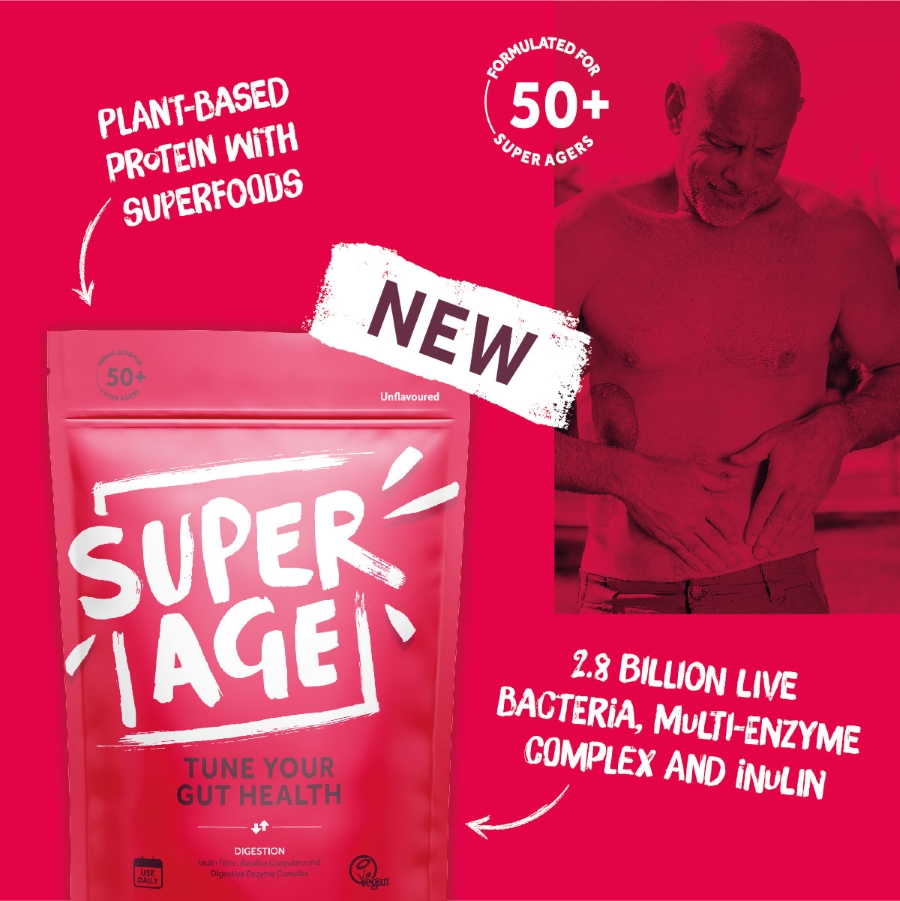The human body changes significantly throughout the different stages of life. At a biological level, there is an accumulation of molecular and cellular damages which lead to progressively reduced physical and mental capacity and increased risk of disease.
After turning 50 in particular, you become more prone to experiencing changes, such as loss of lean muscle mass, weight gain, longer time to recover from physical activities, illness and reduced ability to fight infections and changes in sleep patterns. The good news? There are several things you can do to either delay or manage such this period of your life.
Reviewing and adapting your nutrition to your individual needs regularly is a great place to start and plays an integral part in how you sustain good health and longevity.
On the most basic level, over 50s should prioritise basic nutrient needs such as protein from a variety of sources to provide all the essential amino acids, essential fatty acids to support healthy cholesterol levels and heart health, complex carbohydrates for sustained energy and healthy blood sugar levels, as well as a variety of vitamins and minerals.
However, each individual’s age, levels of physical activity, chronic or acute health conditions dictate the levels of nutrients needed. Those aged over 50, for example, have an increased demand for nutrient-dense foods because they are at a higher risk to experience reduced mobility, lower nutrient absorption and lower metabolic rates.

How are energy levels impacted by age?
The skeletal muscles, which consume the largest amount of energy in the body, progressively decrease in mass with ageing, and so does the metabolic rate, which means that your energy needs are no longer as high as of those in their 20s or 30s.
In addition, over 50s are likely to experience tiredness and fatigue more often due to various age-related changes such as menopause, lowered testosterone levels and digestive issues that may impair the body’s ability to absorb the nutrients in food.
Reduced physical activity due to lower energy levels, in turn, can lead to several health problems that are common among those aged over 50, from type 2 diabetes, weight gain, decreased immunity and cardiovascular disease to faster progression of muscle mass loss.
How can I support a healthy metabolism after 50?
The energy metabolism is a dynamic physiological process and amazingly smart when it comes to choosing the macronutrients it prefers to use as fuel. Carbohydrates are its preferred source of energy followed by fat and protein depending on what is available. It also needs several micronutrients such as iron, magnesium, calcium, manganese, copper, iodine, phosphorus, B vitamins and vitamin C to function at its maximum capacity.
Therefore, a diet based on nutrient-dense plant-based foods, which is lower in calories and high in nutrients such as fibre, complex carbohydrates, lean protein, phytonutrients, vitamins and minerals is going to support your energy levels.

Gut health is even more important as you get older!
The gut plays a central role in supporting the microbiota and breaking down the complex macronutrients you ingest into absorbable nutrients such as peptides, amino acids, fatty acids and sugars. Scientific research has revealed a strong interaction between microbiota and other organs and cells, that can influence our mood, sleep, immunity and cognitive function.
Diets that are high in fat and sugar for prolonged periods are known to imbalance the microbial population in the gut, leading to a phenomenon known as ‘gut dysbiosis’ – often associated with digestive issues such as constipation, bloating, gas, abdominal pain, and IBS which are frequently experienced in over 50s. Poor gut health will not only hinder essential nutrient absorption but also influence your daily life if not addressed promptly.
How can I look after and improve your gut health after 50?
Regular consumption of prebiotic fibre, both soluble and insoluble, is essential as it supports the health of the microbiota. Barley, oats, wheat bran, dried prunes, rye fibre and chicory inulin are great sources of prebiotic fibre known to help increase the faecal bulk to prevent constipation and aid proper bowel function.
Older individuals often experience decreased production of gastric, pancreatic and other digestive juices, which will usually reduce the body’s ability to absorb vital nutrients such as iron, calcium, magnesium, zinc, and Vitamin B12. Therefore, it is recommended that you prioritise the consumption of foods high in these micronutrients to make up for the reduced absorption rate. Diets or supplements high in calcium can also help improve the normal function of the digestive enzymes, which are needed to break down food and absorb nutrients.

How does getting older impact my immunity?
Your immune system is a very sophisticated and complex physiological mechanism. It works around the clock to protect your body against harmful substances, germs, and undesired cell changes. A well-balanced immune system can fine-tune its response to infections and environmental factors repeatedly, which is vital for good health and wellbeing.
As we get older, however, it not only takes longer to recover from physical activities, but also from illness and infections. This happens due to the dysregulation of the innate and adaptive immune system and inflammation which leads to a weaker immune response.
How can those aged 50 and over support the normal function of the immune system?
Your gut is home to a diverse range of microbiota and houses 70 percent of the immune cells. These immune cells interact with trillions of microorganisms to maintain intestinal homeostasis every day, which is why you should not ignore the importance of gut health when it comes to keeping a well-balanced immune system. A diverse microbial flora in the gut positively influences the immune system and its ability to fight infection and recover from illness.
Diets that are high in fibre, resistant starch and phytonutrients support, enhance, and diversify your gut flora hence supporting the immune system. Lean protein, foods rich in vitamins A, B6, B12, C and D, copper, iron, selenium and zinc also contribute to the normal function of the immune system.
The right nutrition to keep you doing the things you love
While your body is prone to change when ageing, there are several simple habits you can learn, particularly when it comes to your diet, to help maintain satisfactory energy levels, a healthy digestive system and immunity. A diet that prioritises nutrient-dense plant-based foods will generally provide you with fibre, lean protein, complex carbohydrates as well as vitamins and minerals that support overall wellbeing.




















